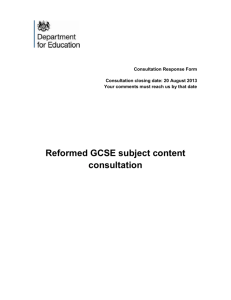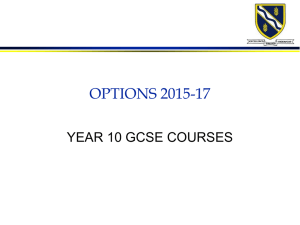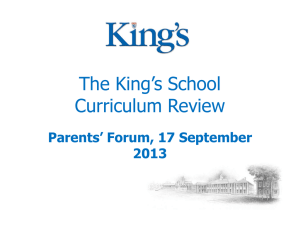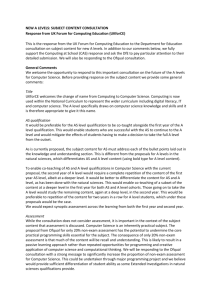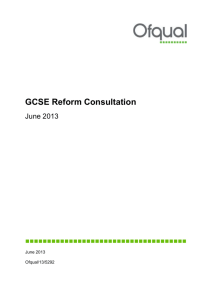UCML response to reviewed GCSEs (July 2013)
advertisement
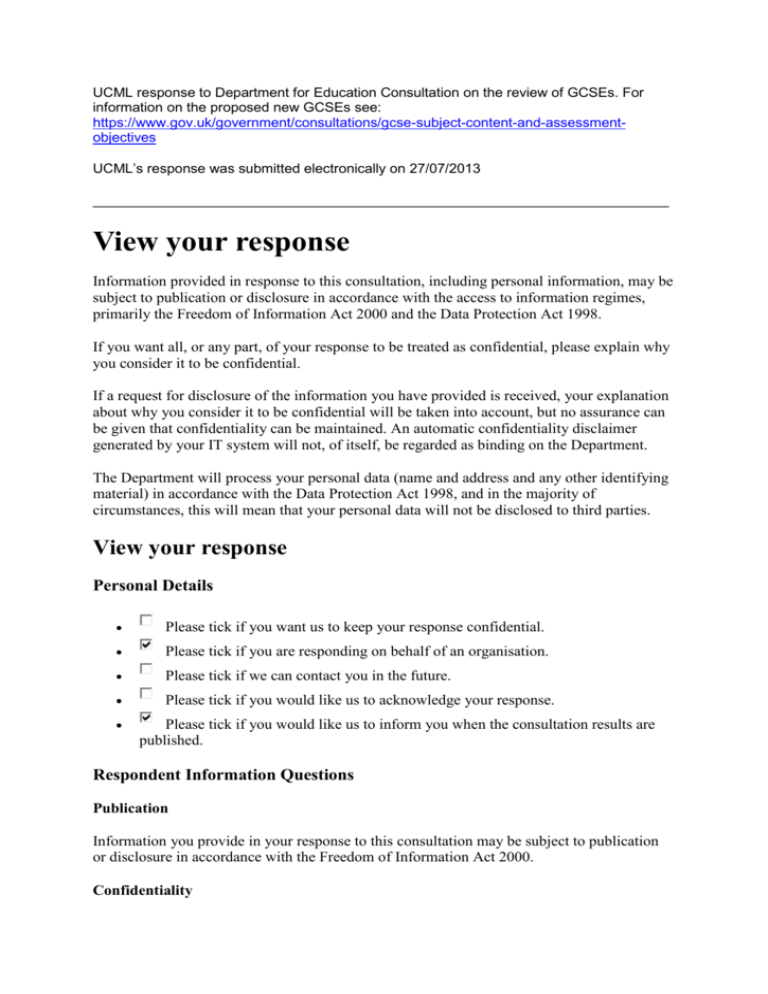
UCML response to Department for Education Consultation on the review of GCSEs. For information on the proposed new GCSEs see: https://www.gov.uk/government/consultations/gcse-subject-content-and-assessmentobjectives UCML’s response was submitted electronically on 27/07/2013 _________________________________________________________________________ View your response Information provided in response to this consultation, including personal information, may be subject to publication or disclosure in accordance with the access to information regimes, primarily the Freedom of Information Act 2000 and the Data Protection Act 1998. If you want all, or any part, of your response to be treated as confidential, please explain why you consider it to be confidential. If a request for disclosure of the information you have provided is received, your explanation about why you consider it to be confidential will be taken into account, but no assurance can be given that confidentiality can be maintained. An automatic confidentiality disclaimer generated by your IT system will not, of itself, be regarded as binding on the Department. The Department will process your personal data (name and address and any other identifying material) in accordance with the Data Protection Act 1998, and in the majority of circumstances, this will mean that your personal data will not be disclosed to third parties. View your response Personal Details Please tick if you want us to keep your response confidential. Please tick if you are responding on behalf of an organisation. Please tick if we can contact you in the future. Please tick if you would like us to acknowledge your response. Please tick if you would like us to inform you when the consultation results are published. Respondent Information Questions Publication Information you provide in your response to this consultation may be subject to publication or disclosure in accordance with the Freedom of Information Act 2000. Confidentiality Please make it clear if you want all/any part of your response to be treated as confidential and explain why. If a request for disclosure of the information you have provided is received by DfE, your explanation will be taken into account, but no assurance can be given that confidentiality can be maintained. An automatic confidentiality disclaimer generated by your IT system will not, of itself, be regarded as binding on the Department. Personal data For the purposes of the Data Protection Act, DfE is the data controller for any personal data you supply in response to this consultation. DfE will process all personal data (such as your name, address and any other identifying information) in accordance with the Data Protection Act 1998. In most circumstances, this means that your personal data will not be disclosed to third parties. Please do not: provide information in comments boxes that might identify you unless you are content for that information to be released into the public domain; or provide information in your response that might lead to the identification of other living individuals Please mark the box that best describes you as a respondent. Academy/and or Free school Comprehensive school State selective school Independent school Special school Further Education college Sixth Form college Subject Association Organisation representing teachers Parent Young person Higher Education Teacher Governor Employer/Business Awarding Organisation None of the above (please state what) Please Specify: National membership organisation of Higher Education departments of languages and related studies Information sharing The Office of Qualifications and Examinations Regulation (Ofqual) is undertaking a parallel consultation on regulatory conditions for GCSEs. Please tell us if you or your organisation has responded or is intending to respond, to Ofqual’s consultation: Yes No Don't Know Please only respond to the next statement if you have ticked ‘no’ or ‘don’t know’ above: If you provide comments to us that are relevant to Ofqual’s consultation, we intend to forward your responses to them so they can be considered by Ofqual. If you do not want us to do this then please opt-out by ticking the box below: I do not want DfE to forward my response to this consultation to Ofqual I am happy for you to forward my response to Ofqual Please Specify: Consultation Questions Questions 1-6 below ask you to give your views with reference to a specific subject suite: 1. 2. 3. 4. 5. 6. English, Mathematics Sciences Geography History Modern and ancient languages. You do not need to give answers for all the subject suites - please answer only with respect to those subjects on which you have a particular view. Please ensure that you answer questions 7-11 as well – we would like responses from everyone on those. 1 a) English, including English language and English literature Do the proposed subject content and assessment objectives for English, which includes English language and English literature, cover the appropriate knowledge and understanding for GCSEs in these subjects? Yes No - insufficiently demanding No - overly demanding Not Sure No Response Comments: 1 b) Is the relative weighting of the assessment objectives right for English, which includes English literature and English language? Yes No Not Sure No Response Comments: 1 c) Has the right practical content for English language been identified to allow students to gain the skills to progress in the subject, beyond the content which can be examined externally and reliably included in the GCSE grade? Yes No Not Sure No Response Comments: Up to a point. There is astonishingly no cross-reference within the English language GCSE to awareness of language and structures in the learning of other languages, to variations etc. Nor of the ability to demonstrate transferable skills in reading, writing, listening and speaking from the learning of other languages to English and vice versa. There is no opportunity for those for whom English is not their first language to draw on their bilingualism to demonstrate a critical understanding of the English language. Specifically re English language: assessment objectives include 'style and register' in writing (but not in speaking where they are are also vital) but the subject content don't. These are vital. We are however keen on the grammatical element, including the ability to talk about grammatical forms, but these should also be cross-reference to their awareness of grammatical differences in other languages. 1 d) Do the proposed subject content and assessment objectives for English, which includes English literature and English language, provide assurance that essential knowledge taught at the earlier key stages is built upon and represented adequately? Yes No Not Sure No Response Comments: In most respects yes. But there is no awareness built in of the completion of previous key stages in languages other than English and of how the two subjects can crossreference and support each other. 1 e) Will the proposed qualifications in English, which includes English language and English literature, secure sound progression for the purposes of further academic and vocational study? Yes No Not Sure No Response Comments: 2 a) Mathematics Do the proposed subject content and assessment objectives for mathematics cover the appropriate knowledge and understanding for GCSEs in this subject? Yes No - insufficiently demanding No - overly demanding Not Sure No Response Comments: 2 b) Is the relative weighting of the assessment objectives right for mathematics? Yes No Not Sure No Response Comments: 2 c) Has the right content for mathematics been identified for high achievers, including those going on to study A levels in science, technology, engineering and/or mathematics (STEM)? Yes No Not Sure No Response Comments: 2 d) Do the proposed subject content and assessment objectives for mathematics provide assurance that essential knowledge taught at the earlier key stages is built upon and represented adequately? Yes No Not Sure No Response Comments: 2 e) Will the proposed qualifications in mathematics secure sound progression for the purposes of further academic and vocational study? Yes No Not Sure No Response Comments: 3 a) Science, including biology, chemistry, physics and combined science Do the proposed subject content and assessment objectives for science, which includes biology, chemistry, physics and combined science, cover the appropriate knowledge and understanding for GCSEs in these subjects? Yes No - insufficiently demanding No - overly demanding Not Sure No Response Comments: 3 b) Is the relative weighting of the assessment objectives right for sciences, which includes biology, chemistry, physics and combined science? Yes No Not Sure No Response Comments: 3 c) Has the right practical content for science been identified to allow students to gain the skills to progress in the subject? Yes No Not Sure No Response Comments: 3 d) Do the proposed subject content and assessment objectives for sciences, which includes biology, chemistry, physics and combined science, provide assurance that essential knowledge taught at the earlier key stages is built upon and represented adequately? Yes No Not Sure No Response Comments: 3 e) Will the proposed qualifications in sciences, which includes biology, chemistry, physics and combined science, secure sound progression for the purposes of further academic and vocational study? Yes No Not Sure No Response Comments: 3 f) Will the combined science double award provide students with a sufficiently secure basis for progression to A level study of each of biology, chemistry and physics? Yes No Not Sure No Response Comments: 4 a) Geography Do the proposed subject content and assessment objectives for geography cover the appropriate knowledge and understanding for GCSEs in this subject? Yes No - insufficiently demanding No - overly demanding Not Sure No Response Comments: I can't comment specifically on geography, but given that the Modern Languages proposed subject content includes: "make appropriate links to other areas of the curriculum to enable bilingual and deeper learning, where the language may become a medium for constructing and applying knowledge" there appears to be no reciprocal indication of how language learning might provide opportunities to explore geography through the medium of another language, thus increasing understanding of the world we live in 4 b) Is the relative weighting of the assessment objectives right for geography? Yes No Not Sure No Response Comments: 4 c) We are working on options to ensure that fieldwork takes place. One option might be a letter, submitted to AOs and signed by the head teacher and head of geography, which states that fieldwork has taken place beyond the classroom and school grounds. Do you think this would be an effective measure to demonstrate that fieldwork has taken place beyond the classroom and school grounds? Do you have any other suggestions to verify that fieldwork has taken place beyond the classroom and school grounds? Yes No Not Sure No Response Comments: 4 d) Do the proposed subject content and assessment objectives for geography provide assurance that essential knowledge taught at the earlier key stages is built upon and represented adequately? Yes No Not Sure No Response Comments: See response to 4a). Previous key stages (2 and 3) include language learning which could be built on to enrich the geography GCSE further. 4 e) Will the proposed qualifications in geography secure sound progression for the purposes of further academic and vocational study? Yes No Not Sure No Response Comments: 5 a) History Do the proposed subject content and assessment objectives for history cover the appropriate knowledge and understanding for GCSEs in this subject? Yes No - insufficiently demanding No - overly demanding Not Sure No Response Comments: I can't comment specifically on history, but given that the Modern Languages proposed subject content includes: "make appropriate links to other areas of the curriculum to enable bilingual and deeper learning, where the language may become a medium for constructing and applying knowledge" there appears to be no reciprocal indication of how language learning might provide opportunities to explore history through the medium of another language, thus increasing understanding "the world in which we live" (quoted from the history subject content). 5 b) Is the relative weighting of the assessment objectives right for history? Yes No Not Sure No Response Comments: 5 c) Should students be encouraged, as part of their GCSE history studies, to undertake a historical investigation that gives them the opportunity to conduct independent research into a historical issue, event or process of their choosing resulting in an extended essay? If so, how can this be achieved best? Yes No Not Sure No Response Comments: 5 d) Do the proposed subject content and assessment objectives for history provide assurance that essential knowledge taught at the earlier key stages is built upon and represented adequately? Yes No Not Sure No Response Comments: See response to 5a). Previous key stages (2 and 3) include language learning which could be built on to enrich the history GCSE further. 5 e) Will the proposed qualifications in history secure sound progression for the purposes of further academic and vocational study, including encouragement of the ability to conduct independent study in the subject? Yes No Not Sure No Response Comments: Given the extremely high demand for language skills by HE historians, in order to further their academic study and to study the history of other countries/cultures, we are deeply concerned about the lack of cross-reference to the importance of language skills to enrich the academic potential of those who study history at GCSE 6 a) Modern and ancient languages Do the proposed subject content and assessment objectives for modern and ancient languages cover the appropriate knowledge and understanding for GCSEs in these subjects? Yes No - insufficiently demanding No - overly demanding Not Sure No Response Comments: We welcome the new proposed subject content and assessment objectives broadly. We particularly welcome the inclusion of "make appropriate links to other areas of the curriculum to enable bilingual and deeper learning, where the language may become a medium for constructing and applying knowledge"; however, the content focusses much more on an 'arts and humanities' bias (e.g. literary texts etc) than on recognising the wider cross-curricular links e.g. to the STEM subjects which are possible. There is therefore the danger that Modern Languages GCSEs continue to be considered as arts and humanities qualifications rather than as key academic skills with fully cross-curricular relevance. 6 b) Is the relative weighting of the assessment objectives right for modern and ancient languages? Yes No Not Sure No Response Comments: 6 c) Do the proposed subject content and assessment objectives for modern and ancient languages provide assurance that essential knowledge taught at the earlier key stages is built upon and represented adequately? Yes No Not Sure No Response Comments: Provided that there is actual progression from Key Stage 2 to Key Stage 3 (which is currently far from guaranteed), then yes. 6 d) Will the proposed qualifications in modern and ancient languages secure sound progression for purposes of further academic and vocational study? Yes No Not Sure No Response Comments: Much sounder than previously, especially in terms of providing a basis for further language learning (same language or new language). However, a greater focus on the foundation of GCSEs in modern and ancient languages as providing key and transferable life skills for academic or vocational study/purposes, regardless of pathway (e.g. STEM, arts and humanities, vocational pathways) in a multilingual, multicultural, global context and on global citizenship skills would be welcomed. Please answer all the remaining questions, which include questions on literacy, numeracy and impact on specific groups of students. 7 Does the English language content cover the key elements of literacy needed for employment or further study? Yes No Not Sure No Response Comments: In overarching terms the answer is yes. However, the lack of cross reference to the literacy skills gained in modern/ancient languages GCSEs is entirely missing. 8 Does the mathematics content cover the key elements of numeracy needed for employment or further study? Yes No Not Sure No Response Comments: 9 Do any of the proposals have potential to have a disproportionate impact, positive or negative, on specific pupil groups, in particular the 'protected characteristic' groups? (The relevant protected characteristics are disability, gender reassignment, pregnancy and maternity, race, religion or belief, sex and sexual orientation); if they have potential for an adverse impact, how can we reduce this? Yes - positive impact Yes - negative impact No Not Sure No Response Comments: I don't see a disproportioinate impact, more a missed opportunity for benefit and inclusiveness: Both the English and modern/ancient languages proposals would benefit from more conscious statements in respect of inclusion and valuing of the skills of bilingual pupils within the school system: i.e. recognition of the benefits that can be derived in terms of awareness and knowledge of diverse language systems, communication skills, cultures etc which can be drawn upon first hand, or enrich the learning of peers in fulfilling the proposed objectives better 10 Have you any further comments? Answer: 11 Please let us have your views on responding to this consultation (e.g. the number and type of questions, whether it was easy to find, understand, complete etc.). Answer: Very straightforward, thank you


